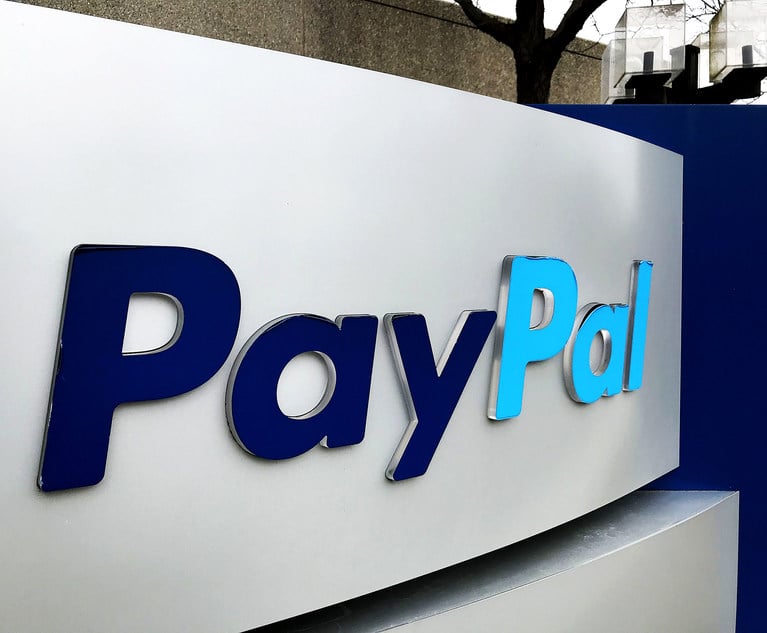Google and Prosecutors Spar Over Sanctions in Foreign Data Case
The federal judge overseeing Google Inc.'s fight with federal prosecutors over foreign-stored data expressed concerns Wednesday over the company's continued refusal to comply with a search warrant in a criminal investigation.
October 18, 2017 at 06:09 PM
8 minute read
 SAN FRANCISCO — The federal judge overseeing Google Inc.'s fight with federal prosecutors over foreign-stored data expressed concerns Wednesday over the company's continued refusal to comply with a search warrant in a criminal investigation.
SAN FRANCISCO — The federal judge overseeing Google Inc.'s fight with federal prosecutors over foreign-stored data expressed concerns Wednesday over the company's continued refusal to comply with a search warrant in a criminal investigation.
U.S. District Judge Richard Seeborg of the Northern District of California held off ruling on prosecutors' request to sanction Google for failing to comply with his August decision ordering the tech giant to hand over the contents of 22 email accounts. Likewise, the judge didn't indicate whether he'd grant the government's request for an evidentiary hearing about Google's decision to stop responding to search warrants for data stored abroad after a decision last year from the U.S. Court of Appeals for the Second Circuit found Microsoft didn't have to hand-over foreign-stored emails.
But Seeborg did press Google's lawyer, Todd Hinnen of Perkins Coie, to lay out what made Google's case special.
“In some ways the biggest concern I have is this notion that a private entity can pick and choose when it's going to respond to an order that says it must comply,” Seeborg said.
“The usual process is [to] comply with the order of a United States District Court,” Seeborg said. “That's pretty straightforward.”
Hinnen responded that this case put Google in a “Catch-22.” If the company complies with the court's order, it would give up its right to appeal an issue where it's seeking clarity in the law. But by failing to hand over the emails, Google's lawyer conceded the company will inevitably be in contempt of court.
“I can tell you if it weren't necessary to perfect [Google's] right to appeal, we wouldn't be here,” he said.
The hearing comes as tech companies face increasing dilemmas over how to handle U.S. court orders that fly in the face of foreign privacy regimes. Seeborg noted early in Wednesday's hearing that the U.S. Supreme Court recently announced it will take up the Second Circuit's decision in the Microsoft case. The upcoming decision from the High Court, Seeborg said, could give Google the clarity it's seeking.
Arguing for the government, Justice Department lawyer Andrew Pak urged Seeborg to set any potential sanction for non-compliance with the warrant well above the $10,000 per day threshold Google pitched. “Google is a profit-driven company and its behavior is going to be altered by something that's actually going to affect its bottom line,” said Pak, noting the $600 billion market cap of Google's parent company, Alphabet Inc. “We don't even know that everything they were supposed to preserve was actually preserved and that's a huge problem.”
 SAN FRANCISCO — The federal judge overseeing
SAN FRANCISCO — The federal judge overseeing
U.S. District Judge
But Seeborg did press
“In some ways the biggest concern I have is this notion that a private entity can pick and choose when it's going to respond to an order that says it must comply,” Seeborg said.
“The usual process is [to] comply with the order of a United States District Court,” Seeborg said. “That's pretty straightforward.”
Hinnen responded that this case put
“I can tell you if it weren't necessary to perfect [
The hearing comes as tech companies face increasing dilemmas over how to handle U.S. court orders that fly in the face of foreign privacy regimes. Seeborg noted early in Wednesday's hearing that the U.S. Supreme Court recently announced it will take up the Second Circuit's decision in the
Arguing for the government, Justice Department lawyer Andrew Pak urged Seeborg to set any potential sanction for non-compliance with the warrant well above the $10,000 per day threshold
This content has been archived. It is available through our partners, LexisNexis® and Bloomberg Law.
To view this content, please continue to their sites.
Not a Lexis Subscriber?
Subscribe Now
Not a Bloomberg Law Subscriber?
Subscribe Now
NOT FOR REPRINT
© 2025 ALM Global, LLC, All Rights Reserved. Request academic re-use from www.copyright.com. All other uses, submit a request to [email protected]. For more information visit Asset & Logo Licensing.
You Might Like
View All
'It's Not Going to Be Pretty': PayPal, Capital One Face Novel Class Actions Over 'Poaching' Commissions Owed Influencers

'Tragedy of Unspeakable Proportions:' Could Edison, DWP, Face Lawsuits Over LA Wildfires?
7 minute read

Meta Hires Litigation Strategy Chief, Tapping King & Spalding Partner Who Was Senior DOJ Official in First Trump Term
Trending Stories
- 1'It's Not Going to Be Pretty': PayPal, Capital One Face Novel Class Actions Over 'Poaching' Commissions Owed Influencers
- 211th Circuit Rejects Trump's Emergency Request as DOJ Prepares to Release Special Counsel's Final Report
- 3Supreme Court Takes Up Challenge to ACA Task Force
- 4'Tragedy of Unspeakable Proportions:' Could Edison, DWP, Face Lawsuits Over LA Wildfires?
- 5Meta Pulls Plug on DEI Programs
Who Got The Work
Michael G. Bongiorno, Andrew Scott Dulberg and Elizabeth E. Driscoll from Wilmer Cutler Pickering Hale and Dorr have stepped in to represent Symbotic Inc., an A.I.-enabled technology platform that focuses on increasing supply chain efficiency, and other defendants in a pending shareholder derivative lawsuit. The case, filed Oct. 2 in Massachusetts District Court by the Brown Law Firm on behalf of Stephen Austen, accuses certain officers and directors of misleading investors in regard to Symbotic's potential for margin growth by failing to disclose that the company was not equipped to timely deploy its systems or manage expenses through project delays. The case, assigned to U.S. District Judge Nathaniel M. Gorton, is 1:24-cv-12522, Austen v. Cohen et al.
Who Got The Work
Edmund Polubinski and Marie Killmond of Davis Polk & Wardwell have entered appearances for data platform software development company MongoDB and other defendants in a pending shareholder derivative lawsuit. The action, filed Oct. 7 in New York Southern District Court by the Brown Law Firm, accuses the company's directors and/or officers of falsely expressing confidence in the company’s restructuring of its sales incentive plan and downplaying the severity of decreases in its upfront commitments. The case is 1:24-cv-07594, Roy v. Ittycheria et al.
Who Got The Work
Amy O. Bruchs and Kurt F. Ellison of Michael Best & Friedrich have entered appearances for Epic Systems Corp. in a pending employment discrimination lawsuit. The suit was filed Sept. 7 in Wisconsin Western District Court by Levine Eisberner LLC and Siri & Glimstad on behalf of a project manager who claims that he was wrongfully terminated after applying for a religious exemption to the defendant's COVID-19 vaccine mandate. The case, assigned to U.S. Magistrate Judge Anita Marie Boor, is 3:24-cv-00630, Secker, Nathan v. Epic Systems Corporation.
Who Got The Work
David X. Sullivan, Thomas J. Finn and Gregory A. Hall from McCarter & English have entered appearances for Sunrun Installation Services in a pending civil rights lawsuit. The complaint was filed Sept. 4 in Connecticut District Court by attorney Robert M. Berke on behalf of former employee George Edward Steins, who was arrested and charged with employing an unregistered home improvement salesperson. The complaint alleges that had Sunrun informed the Connecticut Department of Consumer Protection that the plaintiff's employment had ended in 2017 and that he no longer held Sunrun's home improvement contractor license, he would not have been hit with charges, which were dismissed in May 2024. The case, assigned to U.S. District Judge Jeffrey A. Meyer, is 3:24-cv-01423, Steins v. Sunrun, Inc. et al.
Who Got The Work
Greenberg Traurig shareholder Joshua L. Raskin has entered an appearance for boohoo.com UK Ltd. in a pending patent infringement lawsuit. The suit, filed Sept. 3 in Texas Eastern District Court by Rozier Hardt McDonough on behalf of Alto Dynamics, asserts five patents related to an online shopping platform. The case, assigned to U.S. District Judge Rodney Gilstrap, is 2:24-cv-00719, Alto Dynamics, LLC v. boohoo.com UK Limited.
Featured Firms
Law Offices of Gary Martin Hays & Associates, P.C.
(470) 294-1674
Law Offices of Mark E. Salomone
(857) 444-6468
Smith & Hassler
(713) 739-1250






